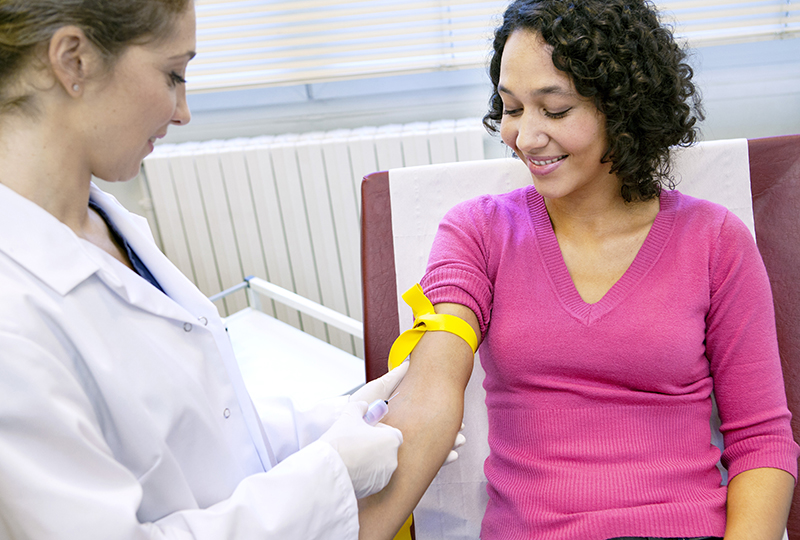These common tests in the first three months of pregnancy are important to the health of mother and baby.
At that first prenatal visit you feel queasy and tired. The nurse informs you that bloodwork will be necessary today so you dutifully roll up your sleeve. Next thing you know, seemingly half of your blood is in various colored tubes on the counter and you are feeling more nauseated than even before.
What are they testing you for anyway? Here is a breakdown of common first-trimester prenatal tests:
Blood type and antibody screen: Your blood type is A, B, AB or O and either Rh (Rhesus factor) positive or negative. While there are several different Rh factors, the most commonly described one is the D antigen. If you are Rh positive, your red blood cells carry this factor on them, and your immune system has produced antibodies to attach to that factor; about 85 percent of Caucasians and between 95 and 99 percent of African-Americans are Rh positive. The antibody screen also looks for past exposure to other blood types, which can occur as a result of pregnancy, miscarriage or blood transfusion. If exposure occurs, your body can form an immune system response against the foreign proteins on those cells. With subsequent pregnancies, these antibodies can cross the placenta and affect the developing baby. This is why it is recommended women who are Rh negative receive a medication called Rhogam during pregnancy so that they don’t develop an anti-D antibody.
Complete blood count (CBC): This test looks at the composition of your blood by percentage of types of cells. It is important especially to know red cell levels, which could signal anemia, and levels of platelets, which are important for blood clotting.
Rubella titer: Rubella is another name for German measles, which if contracted during pregnancy can cause birth defects, including hearing and vision loss, or miscarriage. This test will show if a woman is immune against the disease (the “R” in the commonly given MMR vaccine, along with protection against measles and mumps). Most women who received the vaccination in childhood will have immunity, but occasionally, despite having received the vaccine, immunity will have waned. The MMR vaccine is not safe during pregnancy, so if a woman is not immune, she must be extra vigilant to avoid exposure and should be sure to get a vaccine after pregnancy to provide immunity during any future pregnancies.
Hepatitis B screening: Hepatitis B is a virus that affects the liver. It can be transmitted sexually or through needle sharing, contact with infected blood and body fluids, and — rarely — blood transfusions. If a mother has Hepatitis B, then her baby will need to receive special medication as well as immunization at birth to reduce the risk of transmission.
Syphilis screening: The most common test for syphilis is called an RPR. Syphilis is a sexually transmitted disease that fortunately has become less common. Syphilis can cross the placenta and cause birth defects for baby, but is highly treatable in the mother. Pregnancy can sometimes cause a false positive on the RPR test, in which case the lab will usually automatically do a more sensitive test for confirmation.
Human Immunodeficiency Virus (HIV): The Centers for Disease Control and Prevention recommend that all pregnant women be tested for HIV, and for many women this will be the first time they are tested. HIV transmission from mom to baby can be significantly reduced with medications. If you never do it again, it’s a good idea to seriously consider the test when you consider pregnancy or become pregnant.
Gonorrhea and chlamydia: This test doesn’t use blood but instead either a urine sample or a cervical swab. Gonorrhea and chlamydia are sexually transmitted diseases that often cause no symptoms. Both can cause eye infections in babies if untreated and increase the risk for a mother’s water breaking prematurely, low birth weight and preterm birth. Both are very treatable with antibiotics.
Urine culture: Infection in the bladder without symptoms (called asymptomatic bacteriuria) can lead to more serious infection of the kidneys. If bacteria called Group B Strep is found, then it is recommended that the mother receive antibiotics in labor to prevent transmission to baby.
Some offices also will do tests to screen for thyroid problems and diabetes at the first visit. If you are due for a Pap smear, this will likely be collected. Depending on how far into your pregnancy, options for genetic testing may be offered as well.
It seems like a lot, but these tests are very important for your health and the health of your baby. Of course, talk with your provider if you have any questions.
This post was written by Bethany Sanders, a certified nurse midwife and cares for women at the West End Women’s Health Center and Vanderbilt Primary Care Mt. Juliet. While originally from the Midwest, she is thrilled to have called the South home since graduating Vanderbilt in 2006. When not attending births or measuring pregnant bellies she can be found at the local park chasing around her two young children and discussing babywearing, cloth diapers and breastfeeding.

Vanderbilt Women’s Health provides care for women at all stages of their lives at locations across Middle Tennessee. Learn more here or call 615-343-5700.


